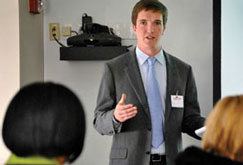
When Susan Pollay, executive director of the Ann Arbor Downtown Development Authority (DDA), wanted to document the economic impact of her organization and others like it around the state of Michigan last fall, she sought help from the Ford School.
Development authorities like Pollay's are funded through a mechanism called Tax Increment Financing, which allows them to capture some of the property tax growth from new construction in their district—funds that would otherwise go to other local taxing entities. As those entities' budgets have become increasingly stretched, though, this mechanism has been increasingly questioned.
Although Pollay thought the project would be a good fit for the Applied Policy Seminar, now called Strategic Public Policy Consulting or SPPC, a semester-long graduate course in which teams of students serve as consultants for community organizations, the quality of the product, and the experience, blew her away.
"We are very happy campers," she says. "We would do it again in a heartbeat. Four students who were incredibly smart, incredibly creative, and incredibly experienced for their age did an amazing job to put together as professional a report as I have ever seen. The intelligent, thorough approach they took resulted in an outstanding final product that has served in some amazing ways to convey information that I might not otherwise be able to convey about what our DDA does, how we do it, and how effectively we do it. I just used it yesterday, sharing the contents with someone in the county community development department."
While Pollay well understands the educational value the students receive, "this was clearly a benefit to me as someone who's working in the community."
Public service has been a vital part of the mission of the Ford School and its antecedents from the start, through commissioned research projects, faculty service to government agencies, and an insistence that students engage in professional internships to earn their degrees. From 1913 into the 1960s, the program's Bureau of Government conducted policy research for dozens of state, county, and local governing bodies. Later, individual faculty integrated applied policy projects into their courses, and in 1997, the school launched a new graduate course, the Applied Policy Seminar (APS), to continue the tradition.
In the early years, Applied Policy Seminar students generally worked for a single client, but in 2010, the format was changed to allow small teams of students to assist a larger number of organizations. Since then, 25 nonprofit organizations, government agencies, and foundations have benefited from APS students' consulting skills. Partnerships with some organizations—such as Macomb County, MI; the City of Adrian, MI; Direct Relief International; The Heat and Warmth Fund; and the U.S. Government Accountability Office—have been sustained for multiple semesters.
"There is tremendous demand for this," says Elisabeth R. Gerber, the Jack L. Walker Jr. Professor of Public Policy, who teaches the APS, now called Strategic Public Policy Consulting or SPPC. "I barely have to mention that I'm doing this and people start pulling out their lists of all the things they would love for a team of Ford School students to work on. The problem for me is having enough students."
There are several criteria for winnowing applicants, but "some of our best clients come to us through alumni connections," she says. "Typically, with them, the fit is really good, the scope is appropriate, the project reflects the interests of our students, and the client understands what their skills and competencies are—what you can and cannot do in a 14-week semester with three or four students working 15 hours a week apiece."
Unlike the Ann Arbor DDA, what makes clients "happy campers" is not always the outcomes they sought.
"It's not the ones who get what they think they want in the beginning, but the most engaged clients, the ones who put the most skin into the game, who get the most out of the students," Gerber says. "Projects often take on a life of their own, and there's a lot of education for the organization, too, as they start to see things in a different light. Students inject some new ideas into how organizations think about their problems, their questions, their planning."
 |
This is especially true when, as is often the case, the client is exploring expanded activities or program development. "A big piece of what they get from our students is a fresh eye on whether it makes sense to move into a new area," she says. "Our students come in from outside and provide that fresh perspective, which is a hard thing for people on the inside. We hear clients say, 'Your students helped us understand a better way to do what we're doing to avoid pitfalls, and also helped us identify new opportunities.'"
It was the opportunity for such public engagement that lured Gerber back to her alma mater in 2001 after a decade of teaching and consulting on the West Coast.
"That's really what brought me here," she says, "the ability in my own work to do exactly the kind of thing the students do in the Applied Policy Seminars, to work with organizations on real policy problems and embark on the kind of engaged scholarship that the Ford School really manifests and facilitates."
--Story by Jeff Mortimer
Below is a formatted version of this article from State & Hill, the magazine of the Ford School. View the entire Spring 2014 State & Hill here.